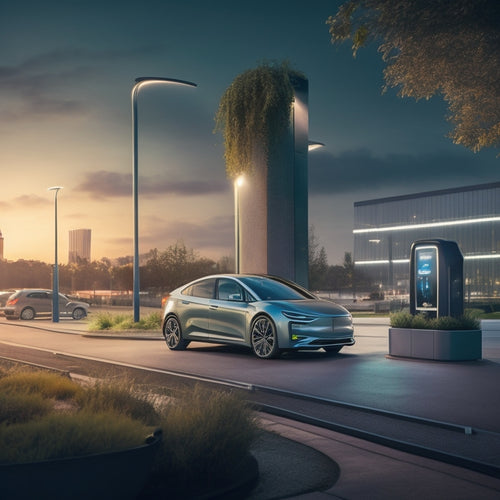
5 Best Off Grid Battery Charging Systems for Sale
Share
You're looking for a reliable off-grid battery charging system that meets your unique energy needs. Top-rated solar battery chargers offer advanced features like MPPT and built-in charge controllers. When selecting a system, consider factors like battery type, capacity, and voltage requirements. You'll want high-efficiency MPPT algorithms and built-in monitoring systems for best performance. From deep cycle battery systems to renewable energy battery banks, the right choice depends on your energy autonomy goals. To find the perfect fit for your off-grid adventures, explore the top 5 off-grid battery charging systems that balance efficiency, reliability, and cost-effectiveness, and discover the key to achieving your energy independence.
Key Takeaways
• Top-rated solar battery chargers with MPPT algorithms and built-in charge controllers provide efficient off-grid energy solutions.
• Consider battery type, capacity, and voltage requirements when selecting a charger that meets energy needs.
• Look for high-efficiency solar panels, durable construction, and advanced charging algorithms in solar powered charging systems.
• A well-designed battery bank with scalable energy storage capacity ensures grid resiliency and energy autonomy.
• Choose a deep cycle battery system with automatic equalization features and high cycle life for reliable backup power.
Top Rated Solar Battery Chargers
You'll find that the top-rated solar battery chargers on the market today offer a range of features and capabilities, from advanced maximum power point tracking (MPPT) to built-in charge controllers and monitoring systems. These chargers are designed to provide efficient and reliable Portable Power for your off-grid energy needs.
In emergency situations, having a reliable solar battery charger can be a lifesaver, serving as an Emergency Backup power source.
When selecting a solar battery charger, consider the type of battery you'll be using, as well as the capacity and voltage requirements. Look for chargers with high-efficiency MPPT algorithms, which can optimize energy harvest and reduce energy losses. Additionally, consider chargers with built-in monitoring systems, which provide real-time data on charging performance and battery health.
For off-grid enthusiasts, portable solar battery chargers offer the ultimate in flexibility and convenience. These chargers are designed to be compact and lightweight, making them easy to transport and deploy in the field.
Whether you're a camper, RV enthusiast, or remote worker, a top-rated solar battery charger can provide the reliable power you need to stay connected and productive.
Off Grid Energy Storage Solutions
When designing an off-grid energy system, selecting the right energy storage solution is crucial, as it directly impacts the overall efficiency, reliability, and cost-effectiveness of your setup. You need a solution that provides energy autonomy, allowing you to store excess energy generated during the day for use during the night or during power outages. A reliable energy storage system ensures grid resilience, reducing your dependence on the grid and minimizing the impact of grid outages.
Here's a comparison of popular off-grid energy storage solutions:
| Solution | Capacity | Cycle Life |
|---|---|---|
| Lead-Acid Batteries | 200-400 Ah | 200-500 cycles |
| Lithium-Ion Batteries | 100-300 Ah | 1,000-3,000 cycles |
| Flow Batteries | 10-100 kWh | 5,000-10,000 cycles |
| Sodium-Ion Batteries | 50-200 Ah | 500-1,000 cycles |
When choosing an energy storage solution, consider factors such as capacity, cycle life, and depth of discharge to make sure you get the right solution for your off-grid energy system. By selecting the right energy storage solution, you can achieve energy autonomy, reduce your reliance on the grid, and ensure grid resilience.
Best Deep Cycle Battery Systems
Deep cycle battery systems, designed to store excess energy generated by your off-grid system, provide reliable backup power during outages and nighttime hours, and selecting the best one depends on your specific energy needs and requirements.
When choosing a deep cycle battery system, you'll want to take into account factors such as cycle life, which refers to the number of charge and discharge cycles a battery can handle before its capacity starts to degrade. Look for systems with a high cycle life, typically above 2,000 cycles, to guarantee your investment lasts for years to come.
Another important aspect is battery maintenance. A well-maintained deep cycle battery system can significantly extend its lifespan. Look for systems with built-in monitoring and control systems that alert you to potential issues, such as low voltage or high temperatures, allowing you to take corrective action. Additionally, consider systems with advanced features like automatic equalization, which helps maintain excellent battery health.
Renewable Energy Battery Banks
Renewable energy battery banks, comprising multiple battery modules connected in a series and/or parallel configuration, optimize energy storage capacity and enhance the overall performance of your off-grid system. By combining multiple batteries, you can achieve higher voltage and capacity ratings, ensuring a reliable and efficient energy supply.
This configuration also enables you to scale your energy storage capacity as your energy needs grow. With a well-designed battery bank, you can achieve grid resiliency, ensuring that your off-grid system can withstand power outages and fluctuating energy demand.
Additionally, a robust battery bank is essential for achieving energy autonomy, allowing you to live off the grid without relying on traditional power sources. When selecting a battery bank, consider factors such as depth of discharge, cycle life, and compatibility with your renewable energy sources.
Solar Powered Charging Systems Review
You can greatly enhance your off-grid system's energy independence by incorporating solar powered charging systems, which harness the sun's energy to recharge your battery bank, providing a reliable and sustainable power source. These systems are ideal for camping enthusiasts, as they offer a convenient and eco-friendly way to keep your devices charged while enjoying the great outdoors.
With a portable inverter, you can power your camping essentials, such as lights, laptops, and smartphones, without relying on noisy generators or grid power.
When selecting a solar powered charging system, consider the size of your battery bank, the amount of energy you need, and the available sunlight in your area. Look for systems with high-efficiency solar panels, durable construction, and advanced charging algorithms to guarantee optimal energy harvesting.
Some popular options include systems with built-in inverters, charge controllers, and monitoring systems. By integrating a solar powered charging system into your off-grid setup, you'll enjoy a reliable, sustainable, and quiet power solution that's perfect for camping, RVing, or remote homesteading.
Frequently Asked Questions
Can I Mix Old and New Batteries in My Off-Grid System?
As you weave a tapestry of power, beware: mixing old and new batteries is a recipe for disaster, as differing battery ages and incompatibilities can spark a chain reaction of inefficiencies, compromising your entire off-grid system.
Do I Need a Charge Controller for My Solar Panel Array?
You'll need a charge controller to regulate the energy flow from your solar panel array, ensuring energy efficiency and preventing overcharging, which can damage your batteries and compromise your off-grid system's performance.
Are Lithium-Ion Batteries Safe for Off-Grid Energy Storage?
You're wondering if lithium-ion batteries are safe for off-grid energy storage. The answer lies in mitigating Thermal Runaway risks and managing Battery Degradation through proper charging, cooling, and monitoring to guarantee reliable, long-term performance.
Can I Use a Single Battery Type for Both Solar and Wind Power?
Can you imagine harnessing both solar and wind power with a single battery type? Fortunately, yes, you can use a single battery type, ensuring energy compatibility and power flexibility, as long as you choose a compatible chemistry, like lithium-ion or lead-acid.
How Often Should I Replace My Off-Grid Battery Bank?
You should replace your off-grid battery bank every 5-7 years, depending on factors like depth of discharge, temperature, and maintenance quality, which involves regular system monitoring and proactive battery maintenance to extend lifespan.
Related Posts
-

Solid State Batteries in Electric Vehicles
Solid-state batteries revolutionize electric vehicles by offering a longer lifespan and higher energy density than tr...
-

Diy Off Grid Solar
By embracing DIY off-grid solar, you can break free from grid dependence, slashing your energy bills by up to 90% and...
-

Applications of Photovoltaic Systems
Photovoltaic systems are versatile, converting sunlight into electricity for various applications. You can use them i...


